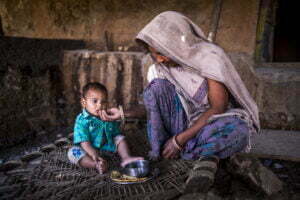In what order do people eat at home?” I posed this question to women who had congregated at the Jamubuda Anganwadi Centre in Udaipur District. A clear trend emerged: first the male breadwinners of the family had food, then the elders and children and at last, came their turn.
A young mother said, “Even when I was pregnant, I made sure that no member of my family went hungry. So, I always ate at the end. Sometimes vegetables or rotis would get over, but I had to make do with what was left.” When dinner gets over before their turn comes, some kill their hunger with tea. “I can go without food all day, but not without tea,” said a woman. A pregnant lady added, “I know that too much tea is bad for my health, but when I don’t have it, I don’t feel like doing anything.”
Another common custom is eating without a plate. Women just take rotis in their hand, occasionally scooping vegetables on it and using it as a plate of sorts. For some, it’s a matter of habit—they have grown up seeing their mothers eat this way and continue the tradition. For others, it reduces the number of plates to be washed or allows them to simultaneously do chores or have a quick bite on their way to their workplace or fields. Poverty is also a reason. Rotis with onions and chilies are a common meal for families with limited resources and they don’t bother with plates for such basic meals. This habit also carries into the introduction of complementary foods for infants. Instead of feeding the child themselves, parents give them a roti, expecting them to eat as they play.

While this might seem like an innocuous practice, it contributes to poor nutrition. Without a plate or bowls, women can’t eat watery preparations like dal and kadhi—both crucial sources of protein, especially for vegetarians. Even runny preparations of vegetables are ruled out. Combined with the custom of eating last and having meals on the go while working, it leads to poor dietary diversity and inadequate calorie intake. If parents don’t introduce complementary foods properly in the child’s diet, she could become malnourished.
Multiple studies, including Eat More, Eat Better, commissioned by CIFF, point to the role of societal attitudes and practices in shaping pregnant and lactating women’s nutritional intake. Our team of POSHAN Champions, with the support of ASHAs and Anganwadi Workers, strive to change customs detrimental to nutrition. We engage with not just mothers, but also husbands, in-laws and other family members, and regularly counsel them to ensure that women receive adequate nutritious food during pregnancy and breastfeeding.
